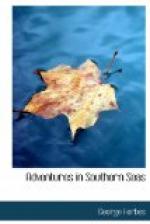During the day upon which we first sighted this phenomenon we attempted every manoeuvre of navigation to keep the ship clear of the weed, but in spite of all we could do, and the ceaseless watch Hartog and I between us kept on deck, the dawn of the next day found the ship as stationary as though we had run ashore.
“Nothing but a gale from the right quarter can save us, Peter,” said Hartog when we held a consultation together in the cabin, “and even a gale will not help us unless it comes soon and before the weed gathers.”
I knew what he said was plain truth, yet I advised we should keep a brave face before the men, as nothing would be gained by provoking a scare.
Notwithstanding our assumed cheerfulness, however, we could see the crew were becoming alarmed, and as each day added to the accumulation of the weed which collected between us and the open sea, anxious looks were turned to the horizon in the hope of detecting the long-expected breeze.
So as to give the men occupation, and prevent their brooding, Hartog gave directions to man the boats in order that an attempt might be made to tow the ship through the weed, but after two days’ fruitless effort the attempt was abandoned. It was dreadful to contemplate our impotence in the face of this danger, which hourly grew upon us. The seaweed, in itself so harmless that it becomes the sport of children when washed ashore upon the beaches at home, here, in its original and monstrous growth became more terrifying than all the Leviathans of the deep. There was something irresistible in this brown mantle which drew its folds so silently and yet so surely around us that even Dirk Hartog’s indomitable spirit quailed at the thought of what might be before us. “What demon led us hither, Peter?” he said to me when a week had passed, and we still rode motionless in the grip of the seaweed. “Of all the perils which mariners must face, whoever heard of a ship’s company being brought to their doom by floating kelp?”
I told him of the sea of which I had read, and which I believed we had come to. He listened to me with patience, and then relapsed into a reverie, from which I found it impossible to arouse him.
On coming on deck I detected Van Luck at his old game of sowing discord among the men. They did not, however, appear to pay much attention to what he said. He had now no authority over them, and none but Janstins and Bantum, who were with us on this second voyage, remembered him as the first officer of the “Endraght”. The ingratitude of the man, however, after the consideration we had shown him, angered me, and I spoke to him roughly, and ordered him to quit the deck.
“Take heed,” I warned him, “that I do not have you put in irons, or sent adrift upon a second voyage.”
Van Luck obeyed me with a scowl, and slunk below, but I could see an evil light in his eyes which I attributed to madness, though I was subsequently to learn there was much method in it. I did not like to add to Hartog’s anxieties by telling him of Van Luck’s conduct, and, indeed, when I considered our present predicament, it seemed unlikely that Van Luck, or anybody else, could do us much harm or good.




